#people arguing that its HETERONORMATIVE??
Text
ive been trying to not be petty about it but watching 'in another life i would've really liked just doing laundry and taxes with you' get massacred has been slowly driving me insane for hte past week

#peopel applying it to the wrong ships#people arguing that its HETERONORMATIVE??#people saying that laundry and taxes are boring........#missing the fucking point#just all of it#EVEN THE PEOPLE DEFENDING IT HAVE BEEN GETTING IT WRONG#IJM GOING INSANE#i think SOME Of them are intentionally bad takes#BU TI CAN'T TELL THEM APART ANYMORE
18 notes
·
View notes
Text
byler is actually insane bc if it was straight it would be a fairly generic friends to lovers type thing. one of them obviously pining for the other while said other is off dating someone else (who they havent known long) despite still having a more genuine fleshed out relationship with their friend.
"but will gay mike dating girl so mike cant possibly like gay will!!!!"
#im tired of arguing with antis i think its time we resort to humanitys best cure for times like this#violent murder#its just unendingly frustrating how blind heteronormativity makes these people#ik everyone and their dog on this tag has made this post including me#but literally if it was straight EVERYONE would see it#and everyone would be rooting for it#so fucking tired of needing 384829943x more build up than straight ships#byler
38 notes
·
View notes
Note
hey as a TMOC I do think you made a mistake in how you're thinking about race as inseparable from gender. We have experiences at the intersection of transphobia, misogyny, and racism (and anything else we may be experiencing). For example, people of color often get support from our communities when dealing with racism, but being transgender can cause people to support you less, so you have to deal with racism more on your own. We also are seen as more aggressive in queer spaces or on the street more than people realize (both from looking queer and from being a POC).
I support you in addressing transmisogyny and putting the issues of trans women first. I'd encourage you to read and learn about how many trans women and femmes of color think about and relate to gender as a next step.
thank you for pointing this out to me. i was writing quickly and i am definitely coming at this from a Limited perspective so i apologize for making it sound like i was trying to separate the issues — my point was less that being a person of color is a separate issue that is More the cause of violence than transness and more that Being a person of color increases the likelihood of receiving violence based in transphobia, and vice versa. but i understand how i could have worded it better on that point
i definitely need to do a lot more theory research and reading on these kinds of issues if i dont want to just. parrot other peoples talking points without my own thoughts and arguments behind it
#the faceless masses#anonymous#im honestly considering deleting the post because i should have made it non rebloggable in the first place .#and i dont really want to Argue with people who think i dont have some measure of privilege particularly in queer spaces over transfems#like thats the ultimate point here is that In Queer Spaces. trans men and tmes are prioritized and listened to over tmas#to cis white heteronormative society were all scum yknow. so i dont really care whether they think i have privilege over trans women#but its other queer people who talk over trans women and transfems#its not about separating your Malehood or whatever from your transness. its about making it clear#that a large amount of the oppression we face is not Because we are male.#its because we are doing it Wrong.#okay i think ive alienated enough people. be patient with me
0 notes
Text
Good Omens is queering TV/storytelling - part 1: GAZE

I would argue that part of why Good Omens is so refreshingly queer is because it does not cater to the male gaze (which centers around the preferences - aesthetic, romantic, sexual, visual, logical, emotional, political ... - of mainly white men in positions of power):
no oversexualization of groups or types of people: Women or characters that could be read as female presenting are not overly sexualized. In fact, some of them are shown to be grimy, slimy and not sexual at all. All of them are real characters and not just cardboard-cutout on-screen versions of male misogynistic fantasies. They portray real people with real people problems. They are human, or exempt from our categories when portraying angels or demons. There are no overly sexualized bodies in general (as has so far also often been the case with young gay men, PoC, etc.), no fetishization of power imbalances, and not exclusively youthful depiction of love and desire.

sex or sexual behavior is not shown directly (yet): All imagery and symbolism of sex and sexuality is used not to entice the audience but is very intimately played out between characters, which makes it almost uncomfortable to watch (e.g., Aziraphale being tempted to eat meat, Crowley watching Aziraphale eat, the whole gun imagery).
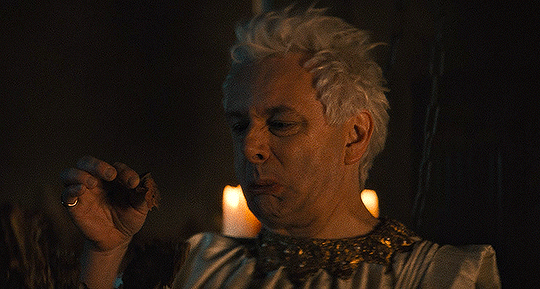
flaunting heteronormativity: Throughout GO but especially GO2, there is very little depiction of heterosexual/romantic couples; most couples are very diverse and no one is making a fuss about it. There is no fetishization of bodies or identities. Just people (and angels and demons) being their beautiful selves (or trying to).
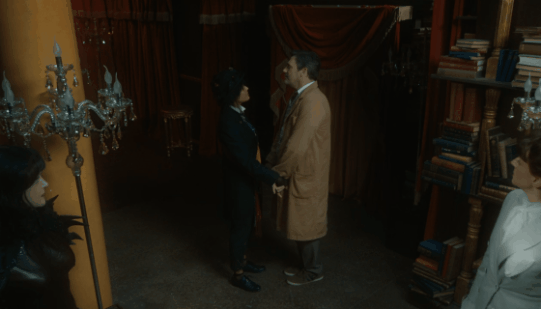
age: Even though Neil Gaiman explained that Crowley and Aziraphale are middle-aged because the actors are, I think it is also queering the idea of romance, love and desire existing mainly within youthful contexts. Male gaze has taught us that young people falling and being in love is what we have to want to see, and any depiction of love that involves people being not exactly young anymore is either part of a fetishized power imbalance (often with an older dude using his power to prey on younger folx) or presents us with marital problems, loss of desire, etc. – all with undertones of decay and patronizing sympathy. Here, however, we get a beautifully crafted, slow-burn, and somehow super realistic love story that centers around beings older than time and presenting as humans in their 50s figuring out how to deal with love. It makes them both innocent and experienced, in a way that is refreshing and heartbreaking and unusual and real.
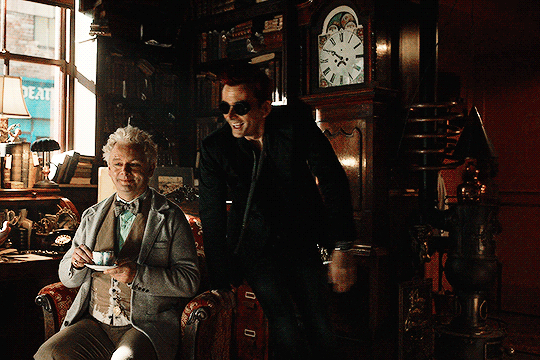
does not (exclusively) center around romantic/sexual love: I don’t know if this is a gaze point exactly but I feel like male gaze and resulting expectations of what a love story should look like are heavily responsible for our preoccupation with romantic/sexual love in fiction – the “boy gets girl” type of story. And even though, technically, GO seems to focus on a romantic love story in the end, it is also possible to read this relationship but also the whole show as centering around a kind of love that goes beyond the narrow confines of our conditioned boxed-in thinking. It seems to depict a love of humanity and the world and the universe and just the ineffability of existence as a whole.
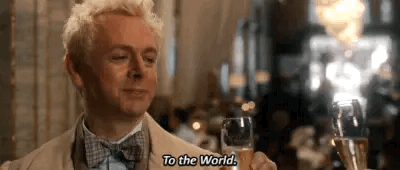
disability as beautiful and innate to existence: Disability is represented amongst angels by the extremely cool Saraqael and by diversely disabled unnamed angels in the Job minisode. Representation of disability is obviously super important in its own right, but is also queers what we perceive as aesthetically and ontologically "normal". Male gaze teaches us that youth and (physical and mental) health are the desirable standard and everything else is to be seen as a deviance, a mistake. By including disability among the angels, beings that have existed before time and space, the show clearly states that disability is a beautiful and innate part of existence.
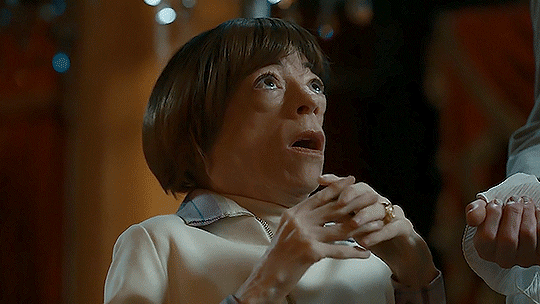
gender is optional/obsolete: Characters like Crowley, Muriel and others really undermine the (visual and aesthetic) boundaries of gender and the black-and-white thinking about gender that informs male gaze. Characters cannot be identfied simply as (binary) men or women anymore just by looking at them or by interpreting their personalities or behaviors. Most characters in GO, and especially the more genderqueer ones, display a balance of feminine and masculine traits as well as indiosyncracies that dissolve the gender binary.
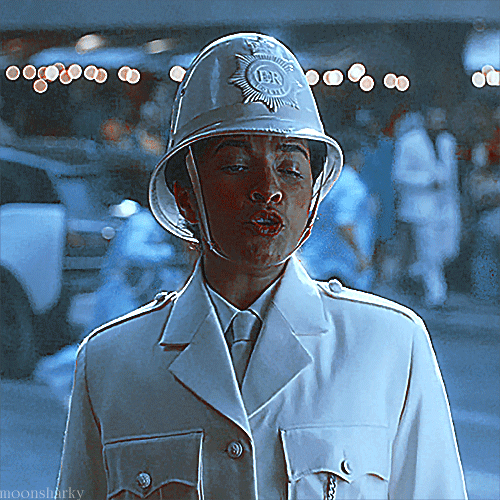
Feel free to add your own thoughts on this in the comments or tags!
#good omens s2#good omens#good omens 2#go2#good omens meta#ineffable husbands#crowley#aziraphale#queer#queer TV#male gaze#thank you neil gaiman for cranking up the queer#neil gaiman#thank you neil gaiman
2K notes
·
View notes
Text
Unfortunately I came across a very strange and misinformed video about Black Butler.

It’s not good. Don’t watch it. Unless you wanna ruin your day, in which case have fun.
Despite it all, I watched it. What left me wondering, however, was how off the mark the person who made the video was on, well, everything.
From their insistence that the Book of Circus Arc theme or point is non existent, to reading Ciel’s character so badly they genuinely thought the Green Witch Arc did nothing for his character development.
While baffled, it also made me think on how someone could read Black Butler so badly.
Sure, you can say that there’s no real way to read or interpret something “in the wrong way” but interpreting The Hunger Games as a pure battle-royale action story would make you believe it’s bad.
“Why are we focusing so much on how the capitol preps them?” Or “Why isn’t Katniss winning everything?” Or “I wanna know more about the rebellion” All questions that miss the actual point of the story - which is criticizing (not solving or ignoring) the way that media distracts us from violence via spectacle.
The same thing applies here. While there is no “right” way to consume media, there’s things that the author makes clear they wanna focus when creating a story. Things that, if you understand, make the story you’re reading actually make sense.
And in Black Butler there’s three things that you have to understand to properly get what Yana is saying.
Sebastian is the protagonist
Ciel and Sebastian’s relationship IS the story.
And that relationship is, fundamentally, a positive one.
A quicker version of it would be:
Black Butler is a love story from the POV of Sebastian, and you have to ship it to get it
- but that’s not entirely true.
You can still look at it as a complex but ultimately positive rship and get in broad strokes of what it’s conveying. It doesn’t have to be romantic. Although, it helps much more than a platonic framing.
(That said, interpreting their rship as father and son, still isn’t the best way to go about it. Mostly because by its very nature of “soul consuming” their relationship is extremely sexually charged. And hey, if you’re into that I don’t judge. However, if you’re desperately trying to interpret their rship as NOT romantic to the point you fall back on heteronormative patriarchal ideals of nuclear familiar as framing device, I don’t think this interpretation bodes with you)
Now, having all that ground work:
Why do I say these are the key components to understand BB?
Okay so, first,
1. Sebastian is the Main Character. The protagonist.
There’s a lot of people who wanna argue against it, claiming he’s either the villain or the antagonist. Both wrong.
He does not function as an antagonist. Even if, and an emphasis on if, you consider Ciel to the protagonist, Sebastian isn’t a narrative antagonist.
If you wanna go back to Creative Writing 101, be my guest. An antagonist is directly defined by the protagonist. It’s the opposing force. If the protagonist wants A, the antagonist wants to stop them from getting A.
Sebastian’s catchphrase is “Yes, my Lord”. He never opposes Ciel, in fact quite the contrary. By the mere fact they’ve created contract, it means that they’ve both agreed in the inevitable outcome.
People want to frame Sebastian as the villain, because Ciel having his soul taken by a demon, would be a BAD END in the context of their moral compass. They see Ciel as a frail victim of abuse, who’s being tricked by Sebastian, who wants Ciel’s soul.
Which is an. Interpretation. A bad one. But still one.
The narrative (and whether the narrative fits your personal moral compass and lack of critical thinking is irrelevant) treats Ciel as an agent in his own destiny. The abuse he suffered was the moment in which he had no control. It’s only after he meets Sebastian that he can rid of both his guilt and his despair, and do what he wants.
In this case though, it’s revenge.
The famous “Asthma” scene shows this. If Ciel is taken back to his past, he becomes helpless. Swarmed with pain and memories that make it so that he can’t even react. Sebastian is his saving grace. If Ciel didn’t have him, and the power he wields to rebuilt what’s broken, he would crumble once more.
If Ciel has a panic attack, because of all the pain he has, Sebastian picks him up and says “you are not a helpless child anymore, you are not a victim anymore, you have the power to do anything. So, what do you wanna do?”
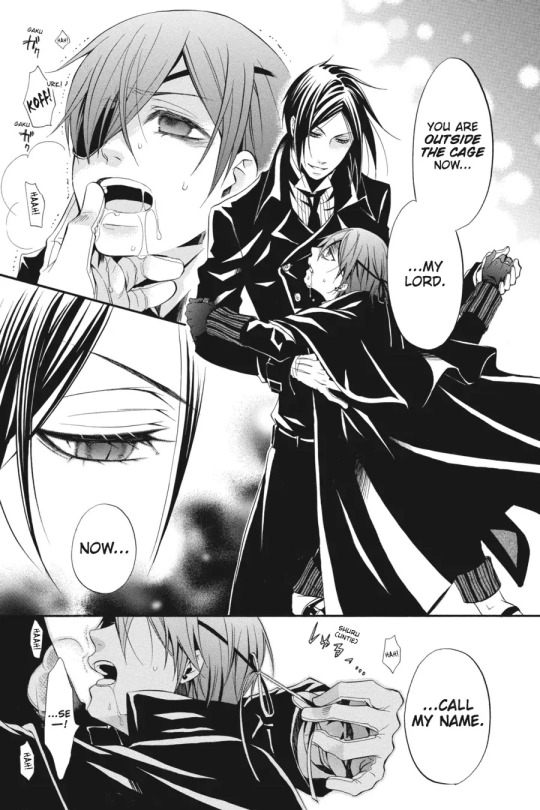
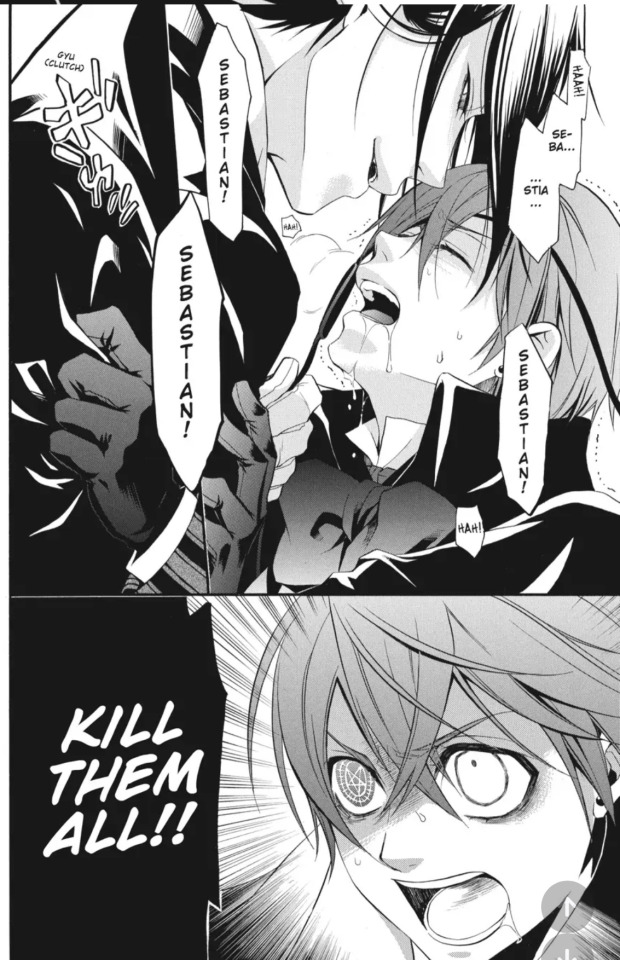
Ciel’s answer is to kill them.
A proper analogy would be to say that, if Sebastian offers a gun, Ciel pulls the trigger. They are both at fault. Sebastian, strictly speaking, is not here to directly cause Ciel’s downfall, but as a tool Ciel uses to plunge into the abyss.
If, again if, you were to frame Ciel as a protagonist, Sebastian falls closer to the “Voice of reason” character. Not a literal voice of reason, but a literary one. If you have a protagonist and an antagonist exchanging ideals, the Voice of Reason serves to engage with the protagonist on their own ideals.
That said, Ciel isn’t the protagonist. The story quickly falls apart if you interpret it as such.
Things such as Ciel’s character arc being…shall I say odd?
It’s not that his character arc isn’t there, but it’s never lineal. His goals stay the same, the only thing that happens is that we start to peel back the “why”s of his goals. Throughout the series it’s never about Ciel understanding himself better, he knows who he is, he knows what he wants, he knows why he wants it. He doesn’t ever need to uncover these, but simply remember them. Because it’s always about the audience understanding Ciel.
He knows he wants revenge.
In the Circus Arc: He knows that he needs Sebastian because without him, the pain of the abuse he suffered would be too much to bear. But WE are introduced to it.
In the Book of Atlantis: He knows that with this new lease he does not want happiness and peace, he wants revenge. The one being told this is the audience.
In Green Witch Arc: He knows that their revenge isn’t for his family, the real Ciel or guilt. It’s because he wants it. He’s angry, he’s upset, and this is entirely for him. The one being told this is the audience.
Except. Not really. The one either discovering or remembering these key moments - is always Sebastian.
Sebastian is the one who reassures him that he now holds the power of a demon to override the pain. Sebastian is the one who remembers that to override that pain, Ciel wants revenge. And Sebastian is the one who discovers that that revenge isn’t built out of grief or guilt, but for himself.
We are witnessing it all, through the eyes of Sebastian.
This is why we have an extremely vague idea of who Ciel is, Sebastian does not have the whole picture.
If you haven’t been reading this manga with your eyes closed, you’ll realize we have a better grasp at Sebastian’s character than that of Ciel. We get a lot of insight on how he thinks and what he values through light hearted dialogue he has with the servants. You even see the character development in these little interactions.
Think about how when he first arrived to the mansion he magically created food with no regards to taste, but when he meets Bard he states that food is created to see whoever will eat it, smile.
That is character development, more than you will be able to see from Ciel.
Because Ciel’s character, while not static, doesn’t go from point A to point B. Mostly, cause it doesn’t need to. He went through that when he lost the real Ciel and got Sebastian. Everything we are watching is the falling out.
Now, given the fact that I’ve told you that it makes more sense for Sebastian to be the protagonist/main character, and that he 100% isn’t either a villain or antagonist in ANY of the interpretations you can get:
Do you believe me?
If you don’t, you’ll probably believe Yana herself.
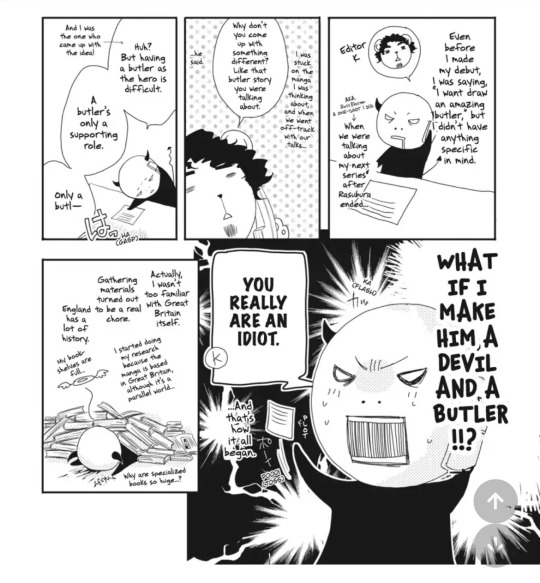
This is from the first Volume, where Yana herself describes the process of making Black Butler. The primary idea behind the creation of BB was a butler as a “hero”.
If you go back to the introductory chapter, you notice that Ciel is barely mentioned. He’s simply the one to give Sebastian impossible tasks and standards that Sebastian must find how to overcome.
Ciel is properly introduced until the NEXT chapter. The second chapter has this formula too, introducing Lizzie as a problem to overcome. Although, to Sebastian the best way to “get rid of the problem” is simply to indulge her.
The issue here being that the problem isn’t as simple as a business meeting but something directly tied to Ciel and Ciel’s past. Each time that Sebastian has to solve a problem, it chips away at Ciel. While with Lizzie he shows a persona, once he’s alone with Sebastian he acknowledges the toll it took on him. It serves to build Ciel as Sebastian’s master, and how some problems aren’t as simple as discarding a tablecloth.
The third and the fourth, are a unified narrative, with a similar premise to the first chapter. Ciel gets kidnapped and Sebastian must find a way to retrieve him without raising suspicions.
If the first chapter is to set up what Sebastian must do as a butler, the third and the fourth serve to set up what he must do as a demon.
The entirety of the volume, and up to Book of Circus Arc, is about how Sebastian tries to follow the increasingly absurd orders that Ciel has - it is not about Ciel trying to solve them.
That’s how they work, we follow Sebastian for the most part, because he’s the one having to come up with the solutions.
If anything, in early Kuro, where the emphasis was more on a slice of life conflict, Ciel is the antagonist. He’s the one creating problems for Sebastian to solve.
What’s more, in the second volume, the very first chapter is one from Sebastian’s POV. So far, we hadn’t gotten an entire chapter from Ciel’s POV. In fact, I would find it hard to point to a single chapter where Ciel is the POV throughout. The reveal of real Ciel and the flashback is the closest contender.
But once we move past early Kuro, and into Book of Circus, this set up changes.
It’s fairly easy to assume that Ciel is the main character, because from this point on the conflict of the plot sorta surrounded him. We spend a lot of time with him and with his story. The enemies start being people directly tied to Ciel and Ciel’s trauma. Rarely, if at all, we get to see Sebastian before he met Ciel.The framing device for the story, is Ciel.
This is where point 2 gets intertwined.
2.- Sebastian and Ciel’s relationship IS the story.
The story begins at the point where Sebastian and Ciel met. Who Ciel was before he met Sebastian, informs why he’s the way he is when he does. You have to know all he went through to understand why he’s a brat, why he lashes out. However Sebastian’s past doesn’t matter…because Sebastian himself doesn’t care much for who he was, before he was “Sebastian”. That’s also part of the narrative.
Unlike Ciel, he doesn’t seem opposed to revealing information from before the contract. He talks about how pets from where he is from are gross, he talks about how he knows how to dance because of other places he’s been to, and alludes to the life he's lived before.
Just that, to him, they're footnotes.
He makes allusions to a very bland, uninteresting life, up to the point he meets Ciel.
That’s why we don’t know more about his past.
As for why we focus on Ciel’s story…okay maybe we need Creative Writing lessons 102
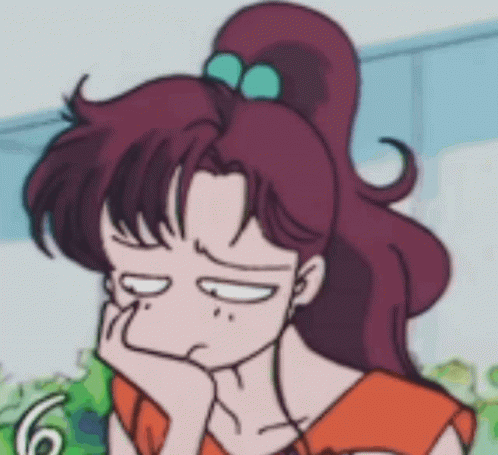
I studied Dramaturgy for about 3 to 4 years. And something you notice is how play-writing is the quintessential story telling. It’s making it work with the bare bones of a story.
Some other mediums have more finesse, more depth, or more spectacle - all amazing things that work for whatever they’re created for. But understanding a play, how and why it works, helps understand the fundamentals of any derivative story telling medium.
Particularly, conflict.
Conflict is dialogue and dialogue can take many forms. A story, in its essence, is a dialogue between two opposing ideas.
Take Batman, for example, who embodies the ideas of justice and order. On his own, he’s not a well rounded character.
If you ONLY present him, in a vaccum with nothing else, you don’t have a character. You have a list of characteristics that you’re supposed to know.
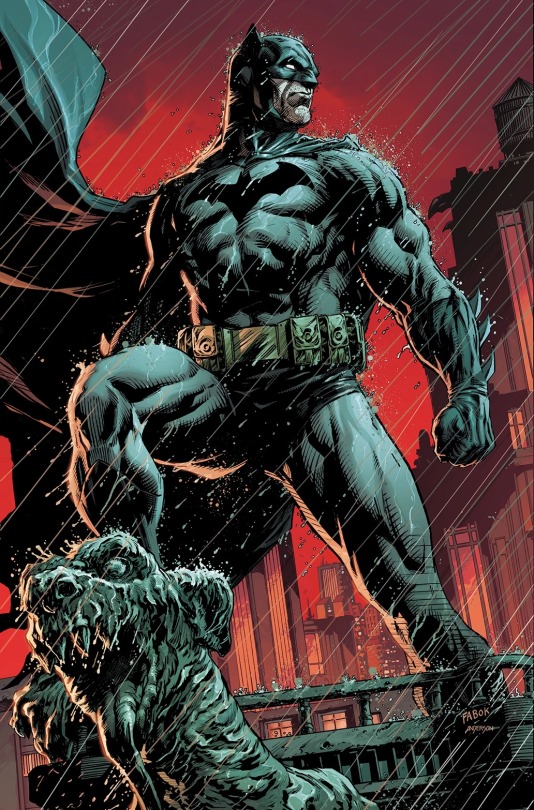
You only know who he is when you have dialogue with another character.
I say Dialogue, but it doesn’t necessarily mean spoken language at one another. Dialogue can mean fist fighting, playing tabletop games, talking to other people about the other, or even just a competition. The idea is to simply to compare and contrast both ideas.
If you want an example on how tabletop games serve as dialogue, watch the video “Well, Someone Had to Explain the Liar’s Dice Scene” by Lord Ravecraft
Another example, were we to retake Batman, you have him fight Joker. Who’s the embodiment of chaos and randomness.
In the following picture, you get far more information than the one previously shown. While the Joke fights with daggers and fake guns, Batman only uses his fists. He doesn’t use the tricks that Joker does. His serious demeanor, contrasted with Joker’s glee at the dangerous situation. The fact that Batman has a deathly grip on Joker’s shirt, while the Joker doesn’t, which shows a desperation to catch him.
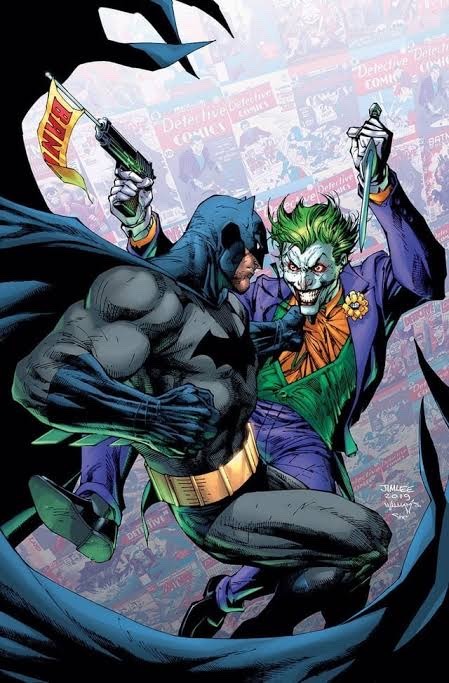
You are being shown, through a dialogue, who Batman is.
It’s so much easier and much more effective to explore a character through another character.
This is the reason why Shonen has a tendency to make incredibly good gay ships. If you want to explore Naruto’s personality, and his feelings of inferiority, you HAVE to have him interact with Sasuke.
If you wanna understand Hinata’s passion for volleyball, you have him enjoy himself the most with the only other crazy motherfucker who’s as obsessed with volleyball - Kageyama.
And I think that originally, Yana had this problem.
Sebastian was the protagonist, but she had little room to develop him as a character in the confines of the manor, dealing with random enemies.
She likely tried to create Grell as someone of the same stature as Sebastian. Someone who could be this other person to engage dialogue with and show or allude to his past a bit more.
The problem being that Sebastian didn’t care for his past. Or really, engaging with anyone. He sees everyone as below him, but when confronted with Grell who isn’t below him, he doesn’t wanna talk to her.
So you’re stuck in conundrum.
How do you have dialogue with a character, that as a character trait, doesn’t really wanna have dialogue?
Well, Grell also solves the problem. Because only the moment she gets him to start any semblance of a dialogue - is questioning why he’s serving Ciel.
And this is the moment when it’s perfectly cemented that the focus of the story is their relationship.
Why is Sebastian here? Why does he stay? What did he see in Ciel that made him want this extremely convoluted contract?
THATS the dialogue.
THATS the conversation we’re having in Black Butler.
We need to know Ciel because understanding who he is, let’s us know WHY /Sebastian/ is here.
Then slowly, with the introduction with the Undertaker, we find out Sebastian’s conflict.
Which is…
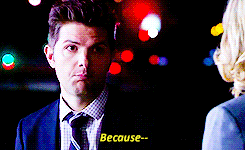
He’s scared of losing Ciel. It becomes apparent with the constant imagery of the Undertaker taking away Ciel and at some point even obtaining r!Ciel’s body, that he’s worried it might happen.
But he can only be worried that Ciel might be taken away if he wants to stay near Ciel.
And that’s his character arc.
Realizing that he actually likes Ciel, cares for him and the role he plays a butler that he doesn’t want this to end.
In the first chapters, he doesn’t feel a need to protect Ciel anymore than what’s strictly necessary. Just don’t die, that’s about as deep as his involvement in chapter 4 gets.
But by the Green Witch Arc, he feels a need to protect Ciel from ANY harm.
This is why I also said
3.- Their relationship is fundamentally a positive one.
In broad strokes, Sebastian to Ciel is the person who allows him to survive. He’s not worried about giving up his soul since he’s already dead. While Ciel to Sebastian, is someone who’s making him have fun. He’s slowly becoming more and more attached to Ciel and the life he has with Ciel.
Their relationship is not that of just a predator and prey, but also of master and pet.
In the terms that Black Butler itself would call: Sebastian is a wild wolf acting like a collared dog.
Ciel is aware that the wild beast will eat him at the end of the day, but if he clings hard to leash for now, he might just be able to have Sebastian maul his abusers.
Sebastian as a dog, currently finds that he enjoys being a chained dog.
(This is demonstrated in the Green Witch arc where he quite literally says, he doesn’t wanna be a wild beast and prefers to be a butler)
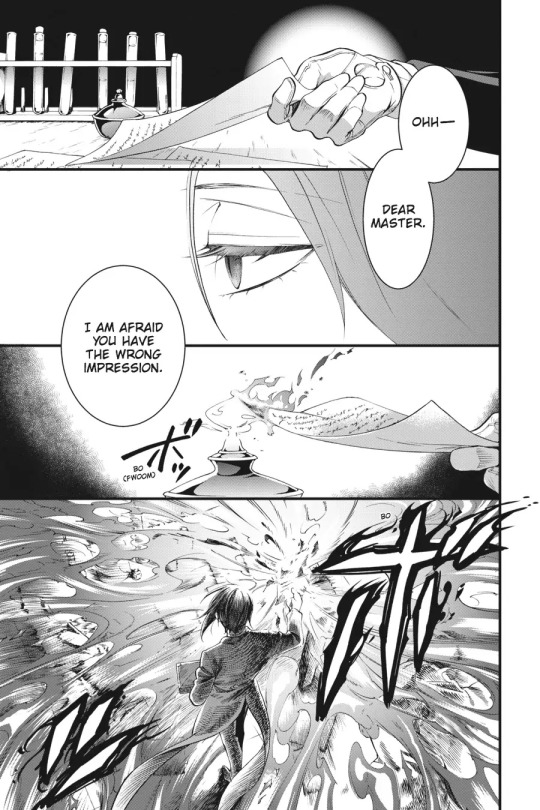
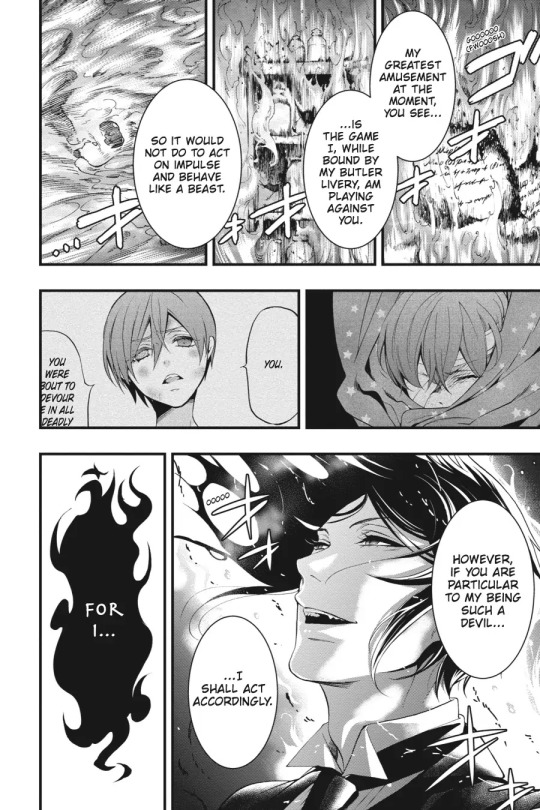
And much like the actual DOG Sebastian, Ciel constantly interprets his attempts to get close and protect him, as an act of aggression.
This push and pull of Ciel’s perception of Sebastian and Sebastian’s true motives is what feeds the story.
And the briefs interludes were that isn’t the case (what other people call the “plot”, but I would refer to as the connective tissue) such as Sullivan and Wolfram, the other servant’s past, the grim reapers and the like, serve as a parallel to Ciel and Sebastian relationship. Either to signify how they care for each other, highlight their weaknesses or fears, or explore how they feel.
It’s no surprise that Sullivan and Wolfram are parallels to Ciel and Sebastian. A sheltered sickly child who seeks the protection of a cold hearted machine that only knew how to kill, but who eventually found he cared for her genuinely.
Undertaker and Claudia’s relationship being heavily paralleled with them, even though we aren’t 109% sure what they had but heavily implied it was a romantic attraction from the undead supernatural creature and a Phantomhive.
Everything is a parallel.
That’s why, like the approach of the terrible original video, is flawed.
Trying to interpret Black Butler as action scene after action scene, with mystery after mystery with the only connective tissue being the mystery of who burned down the mansion - is missing the trees for the forest.
That’s not the point.
And if you’re too much of a prude to engage with gothic horror in its gothic horror game, I see little point as to why you even bother to engage with it at all.
A lot of people, including the person who create the video, simply refuse to acknowledge Black Butler IS the story of Sebastian and Ciel as a close and positive relationship, romantically and sexually charged. The reason for it being that they’re “put off” by it.
Part of me wonders how much that is genuinely true, and how much is just performative outrage. It’s like ignoring the fact that Cersei and Jami are in an incestous relationship and try to frame it as “platonic love”, because the idea of it is THAT off putting.
But regardless of that, if you don’t like the fact that it’s as canon as canon can get, I would reccomend you don’t engage with the story at all.
As I’ve explained, the entirety of the series is about them. If you refuse to see Sebastian and Ciel as, at the very least, a duo that cares deeply for the other - you aren’t reading Black Butler.
I have no idea what you’re reading.Perhaps your own biases and subconscious stigma with British aesthetic. At that point, watch the fucking British Royalty Gossip Magazine. You’d find more substance there.
Just don’t be like the person in the video, please? Don’t play dumb. Don’t ignore the fact that Yana is a Shotacon, don’t ignore the fact Sebastian is a hero, don’t ignore the fact that the entirety of the story is based on Sebastian and Ciel’s dynamic.
Because if you do, you are ashamed. You are ashamed of what this story is about. You don’t wanna engage with the text, you want to engage with yourself. You wanna project into Ciel whatever traumas and experiences you have, for the sake a vanity project, where you come out as the morally superior.
You don’t wanna talk about Black Butler, you wanna talk about how good YOU are. How you “don’t sin” by watching it “without all the gross unholy stuff”.
Which is the exact opposite of what BB is about.
So, if you don’t want to, save us all the humiliation fetish and leave.
502 notes
·
View notes
Text
Mike’s love for El being platonic, and not romantic, and realizing it over the course of season 3 reconciles nearly every contradiction with his behaviour.
He stands like a gay scarecrow as she kisses him in front of Will’s closet. That's him realizing that when he blurted out "I love her and I can't lose her again!" he meant it platonically. But her saying "ily too” WAS CLEARLY NOT PLATONIC, so now he’s left very confused (If he was simply shocked by the fact that she overheard him, he would’ve been surprised initially, and then kissed her back, and been all emotional and happy. But he wasnt.)
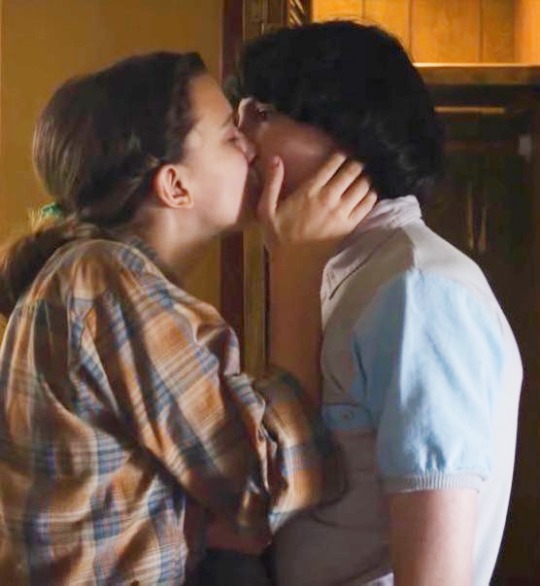

In fact he probably realized his heart fluttered when Will said “not possible” to him in the scene literally 1 minute prior, but NOT when his gf was attempting to make out with him? That’s clearly a problem! lol
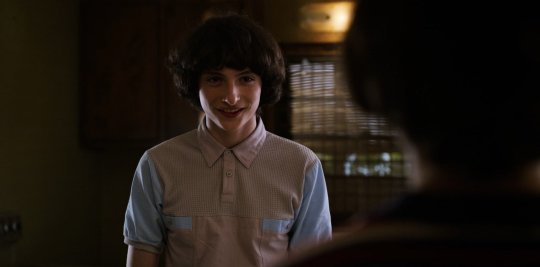
This leads flawlessly into season 4.
Mike has apparently been refusing to even write the word 'love’ in his letters for 6 whole months. Why? Cause he didn't want them to look like love letters.
Meanwhile, he’s jealous of Will painting something for a girl. So he argues with Will about growing apart.
El argues with him about not saying ily. In the fight, he deflects romantic connotations with words like “care” and superhero idolization that he seems suuuper into this season.
He NODS when Will says “What if they don’t like the truth?”. That’s him thinking “Yeah, El won’t like the truth that I don't return her romantic feelings.”

In the van, he says their meeting was dumb luck and anyone could've been there for her that night. That’s hinting that he was just being a decent human. Not that it was a fated love at first sight meeting.
Then Will says, “You’re afraid of losing her”. And THAT is the true issue here.
This whole concept of ‘losing El’ (be it in relationship/daily life, or in death), is scary to Mike, because of what he went through seasons 1-2. At 12 years old, he saw another kid that he developed a bond with, die right in front of his freaking eyes. But they didn’t have a body or anything. So Mike kept getting signs and intuitive feelings that she was still alive. So he questioned his own sanity. For a WHOLE YEAR. Can you imagine how traumatic that is? And then for a kid that age?? That’s exactly why he develops an unhealthy codependency with her in Season 3. And we see it have a negative impact on the unity of the party, and on Will.

But a traumatic response doesn’t change the fact that Season 3 transitions us through the party’s puberty and growth into teenage hood.
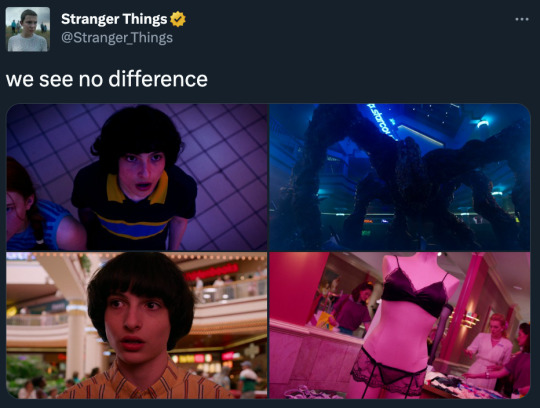
And because of said puberty, Mike starts to realize what actual attraction towards someone is, or in this case… isnt.
Like if we think about the first two seasons, for a 12-13 year old living in that type of society, era, and a picture perfect white suburban American family, it would’ve been really really hard to figure it out back then! Like simply becoming very close friends with the opposite gender caused everyone (cough Nancy cough Lucas) to tell him that “ooooh you must like her”. So yeah, he thinks “I really must like her”. Because he does! He just can’t separate it from actual romantic attraction at that point due to age, and strong heteronormative standards, and no role models like Jonathan telling him “it’s okay to stray from the norm bro”. So of course he acts on it? That’s the NORM. He’s like, “You’re supposed to take a girl you like to the ball”, “We're supposed like girls now”, “This is what growing up means”, “This what old people do”. Like HELLO? Mike says stuff similar to that constantly. Dustin and Lucas do not. So yeah, it can be easily be read as heteronormativity. Not romantic attraction!
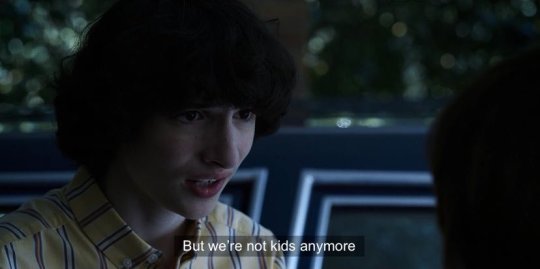
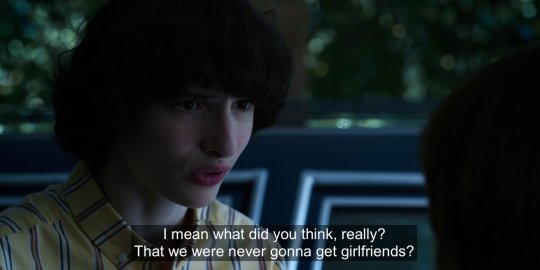
And so despite wanting to spend every day in the summer with El because of copious amounts of trauma from S1-2, he can’t continue believing its romantic attraction when his hormones say otherwise.
Like just look at their kissing scenes S3-4:
Seasons 3 starts with him pulling her hands OFF of him when kissing. He’s voluntarily kissing her instead of spending time with his friends, cause he thinks that’s what he’s supposed to do as he’s “not a kid anymore!”, yet he’s evidently not even enjoying it if he’s taking her hands off lol. Then by the end of the season he doesn’t even kiss back, and has his eyes wide open. Then six months later, when he’s way more self aware of his own feelings, this dude wears SUNGLASSES to the airport. We (and all the characters there) can’t even see his true expression when kissing her. And what’s more, he puts the bouquet of flowers between their bodies, to SEPARATE FASTER. When he could’ve very easily put that hand/arm around her, not between them (that's what he does with his other hand holding the bags).

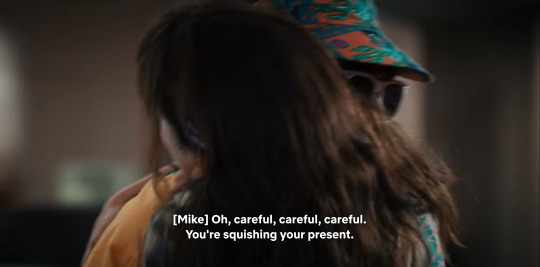
And all of this: all this repression, the contradictions, the unsaid things... it all culminates to the monologue. Will told Mike in the van that El really needed him. And then Will reminds him of this again when El is in the piggyback, cause Will is annoying! (jokes lol). So of course, all rationality, all of Mike's realizations or progression, goes out the window. After all, he is THE HEART. He is needed by her. He can’t go through what he went through in season 1-2 again! It doesn’t matter if it’s not totally true. He needs to tell her what she wants to hear so she won’t DIE. The stakes are extremely high. So he delivers. He even takes all his knowledge of mediocre romance stories, and blurts out that it was love at first sight. It's silly to us the audience, cause if you actually go back and watch season 1 you can see that it's not even fucking true.
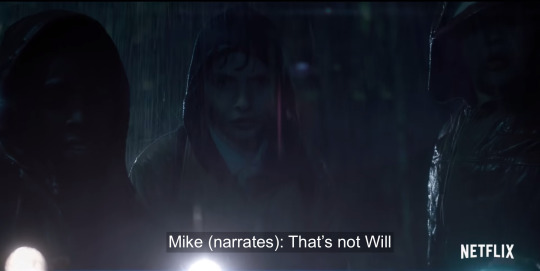
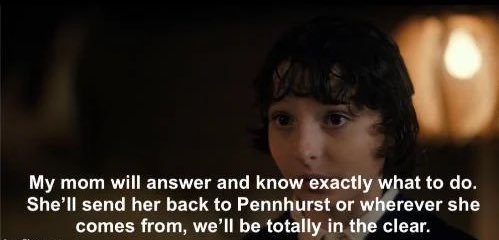
So why would he lie? Well because he doesn’t KNOW when he fell in love with El. Because he never fell in love with her. So yeah. It’s PLATONIC with a capital P.
(And to add a cherry on top, he gives his sister’s ring to her jfc)


#mike wheeler#gay mike wheeler#bi mike wheeler#btw im not trying to say 'mike isn't attracted to women period'#i'm just saying he sees EL platonically#my post can be interpreted as gay mike ofc#but i'm not trying to discount bi mike either#sexuality is a spectrum#bi kids can also confuse feelings due to heteronormativity#byler#will byers#elmike
2K notes
·
View notes
Text
["There's a growing body of published work, including both personal accounts and scholarly research, on how the suppression of non-normative embodiments for the sake of compliance with standards of neuronormative performance (a compliance toward which the neurodivergent are relentlessly pursued throughout their lives) does profound psychological harm to neurodivergent people and is strongly correlated with depression and suicidality. The dominant culture, in other words, pushes neurodivergent people to prioritize passing for "normal" at the expense of their own well-being, mirroring the way that queer people have traditionally been pressured to stay closeted. In the emerging discourse on this issue, the suppression of non-neuronormative embodiments is commonly referred to as masking, and the reclaiming of those embodiments is referred to as unmasking. So it would be entirely accurate to say that neurodivergent unmasking is a form of neuroqueering (one of the most vital forms, I'd argue).
The sort of bodily unmasking I'm talking about here, the reclaiming of previously suppressed ways of moving, can be intense and profoundly transformative. When the suppression has become ingrained unconscious habit (as happens especially when suppression begins in childhood), it's maintained in large part by the layers of deep, chronic unconscious muscular tension which Wilhelm Reich referred to as character armor. Character armor is the bodily component of repression: it serves not only to block the spontaneous performance of various bodily movements and self-expressions, but also to block access to the feelings, yearnings, organismic impulses, and psychological capacities associated with those movements and self-expressions. The process of recovering one's capacity for spontaneous neuroqueer movement is thus deeply and inseparably entwined with both the process of liberating oneself from the chronic tensions of character armor, and the process of recovering and cultivating modes of self-attunement and embodied expression from which one had previously been cut off by those tensions.
The neuroqueer project of reclaiming specific hand movements and stims that one was forced to suppress in childhood is a doorway to broader vistas of neuroqueer practice: in working to reconnect with those movements, one is also reconnecting with and cultivating one's attunements to the inner stirrings, inclinations, and impulses from which such movements emerge. The cultivation of this attunement can develop over time into a vastly expanded repertoire of spontaneous self-expression and a greater capacity to creatively reshape ourselves. Neuroqueering at its best is not only a creative defiance and subversion of both neuronormativity and heteronormativity, but also simultaneously a path toward living more authentically and creatively than the strictures of normative performance would allow."]
nick walker, from neuroqueer heresies: notes on the neurodiversity paradigm, autistic empowerment, and postnormal possibilities, 2021
506 notes
·
View notes
Text
So here’s the thing,
Being visibly queer to the point of ostracism is historically synonymous with gender nonconformity and I don’t think that’s a conversation some are ready to have.
Gender nonconformity as it pertains to Stede is a hot button topic of debate in the fandom rn, and I love that! So much! Queer theory shit is in right now? Sign me tf up! But I see a lot of posts answering “no” to “does Stede wear feminine clothing?” as if it’s the same question. It’s also being talked about as a binary “to be” or “not to be” as if gender nonconformity is not a concept experienced on a spectrum.

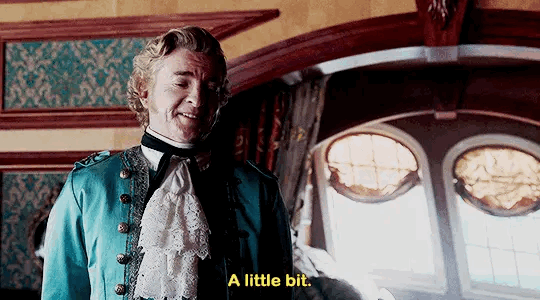
Even if Stede’s clothing can be considered reasonably “masculine” with all the anachronisms, picking flowers, not being able to stomach a “man’s” job, and wearing robes that cause other characters to misgender him are harder sells. The number one thing I see the “Stede is NOT gnc” side say is that these things are only associated with femininity if you’re seeing them from a stereotypical lense. And well… yah. Gender nonconformity is a social construct. That’s what a social construct is. Enjoying bright colors, preferring non-confrontational solutions, wearing a skirt, having long hair, these are all things that are not biologically innate to women. They’re extra characteristics our society uses to construct the idea of a woman. That’s also why gender nonconformity hinges on the cultural context as well. Different societies, different rules.
In order to understand where people are coming from when they say Stede is gnc and use the queerphobia he experiences as evidence, you have to look at the metaphysics. What is homophobia in its original form? What is it made of? I’d argue it’s purest components are the fear that the divides between men and women will break down. It’s considered “an abomination” because sleeping with a man is seen as the natural duty of a woman, and for women, sleeping with a man. Beyond that, all of the baggage that comes with those extra characteristics I mentioned follows suit. Lesbians were by and large excluded from womanhood, in some points of history specifically bottoming was illegal because it was “placing yourself in a woman’s position”, etc.
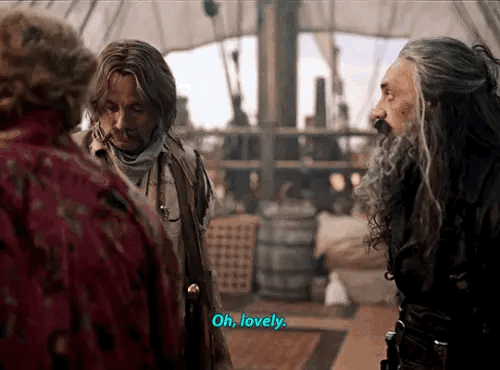
And that’s not to say masc gay men don’t experience homophobia, they absolutely do. I’m just saying if Stede is experiencing specifically the same bigotry as non-passing queer people do in the form of being excluded from his own gender and even from others in his group, then I don’t think he’s one of those men.
Honestly a thousand kudos to @eluciferate for already bringing Albert from “The Birdcage” to the conversation. Cause he really is the perfect example of not only gender nonconformity beyond the literal surface, but the fact that for many it’s a state of being rather than a conscious choice of queer empowerment. When Albert’s son brings home a girl with very conservative parents, and Albert attempts to “play straight” for his sake… he can’t do it. Even in ultra masculine clothes and trying his best, the nonconformity shines through like toes poking out of old shoes.
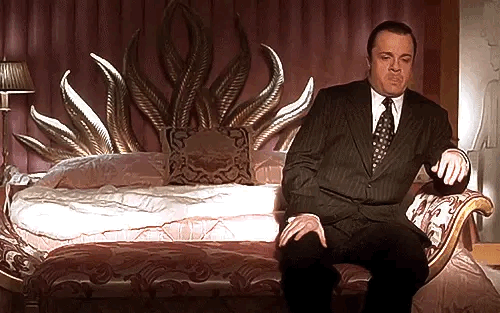
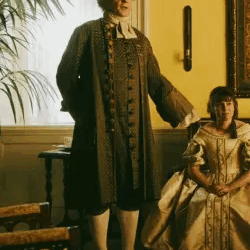
Fuck, Stede wasn’t kidding when he said he was “uncomfortable in a married state”. Even the way he carries himself back home looks carefully minded, like his whole life is a play he was horribly miscast for. In other words sometimes you didn’t purposely decide to stick it to the heteronormative man. Sometimes with great gayness comes great responsibility and that’s that.
Jokes aside, we can nickel and dime all his frilly little affects all we want, but at the end of the day Stede is gender nonconforming in a way that goes beyond aesthetic. And I think a lot of people may be hesitant to read him this way because it requires you to acknowledge homophobia in the show, that Stede’s queerness is commented on and something he actively has to mind before even knowing what it is.
#our flag means death#ofmd#stede bonnet#gnc#gender nonconformity#queer theory#meta#analysis#1x04#1x08#1x01#the birdcage#biceratops
445 notes
·
View notes
Note
Realistically, if he wants children he has to leave jungkook and live with a woman/alone. If Korea suspects he has adopted a child and is raising him with a man, the child most likely will be taken away. This is not Disneyland, grow up.
And that's something to gloat about?
Opinions are like noses. Everyone has them.
Uhm, No. Compulsory hetersexuality is not his only way out in spite of the institutionalized oppression against queer individuals, inspite of the challenges queer Individuals face due to their culture.
Believe it or not Queer families do exist in SK. Queer couples exist in SK. They have for many years and they will for years to come. The world may not have been made to accommodate us but we do exist against the odds.
What you are describing here is perpetuating heteronormative traditional family values, well modern non traditional families exist in South Korea too.
The fact that their culture stigmatize people with tattoos or gay people don't mean people have stopped getting tattoos or that gay people have ceased to exist altogether for fear of oppression.
One thing about queer individuals is, if a loophole exists we will find it. Not too long yall argued its impossible for Jikook to serve together because their laws does not allow gay men to serve together and here they are proving you all wrong
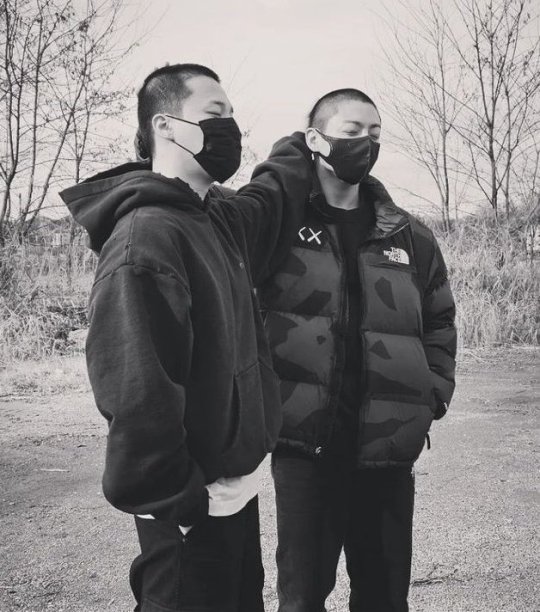
Jimin has options. Believe it or not.
What you are describing is just one option, the easiest- or hardest option way out I'd say depending on how you look at it.
His life, and other queer individual's lives would be so much better if they weren't queer at all won't it?
But then again, lying about your sexuality, marrying a woman to cover up his sexuality, lying to his wife and children about who he is, using another human being to avoid persecution while hiding and meeting up at Rendezvous joints to screw other men and satisfy his gay urges- is cowardly and in itself hell yet quite common.
Some queer men do do that. It's sad, unfortunate and cruel and never easy on them too but it does happen.
If he meets a girl he genuinely loves and falls in love with and wants to build a family with her I would genuinely support that for him. He's bisexual. He can do that. It won't erase his sexuality.
If he has to use another human being to avoid persecution..... I will support that too. A boy gotta do what a boy gotta do. Sorry not sorry.
If he wants to leave SK behind, live forever as a bachelor, a single father, if he wants to use surrogates, or adopt i will support that too- fortunately for him, he has a lot of fame and money and that puts him in a privileged position compared to the average queer man in SK.
Jimin has options. Some more challenging than the other. It's his choice to make, and as he turns 30 and the social pressure increases for him to settle down, I know he's gonna think about these choices and decisions he has to make and he will decide which way to go.
He might feel they are out of time and need to get real and get with the system. Or he can choose himself and his truth and find a way around it.
I will support him any way he swings but the fact that this is what Queer people have to deal with in this life is just sad.
Stay strong Jimin. Hwaiting
86 notes
·
View notes
Note
Stsg is still fanonical at this point,If we push our fanons aside do you think, accordingly to the manga we have read yet, do you think they actually loved each other romantically? Based completely on the canon manga.
i wouldn’t say their care for each other is fanonical, but i do think that the issue of romance will never be touched on in the manga.
(well, besides this.
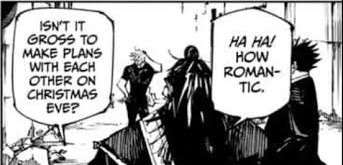
but take that as you will.)
the question of romance is difficult to really tackle because unless gege makes two characters say, “i love you,” in a certain way, an explicit acknowledgment from the creator himself, people will continue to have their own interpretations on ship canonicity. you could argue that subtext is key, but oftentimes, subtext can lean subjective.
romantic subtext is implicit and subtle and it really depends on what you consider “romantic.” this is more difficult when it comes to queer ship canonicity because heterosexual ships (or just heteronormativity in general) are often the point of reference for romantic subtext in a story.
let’s take the most plain-to-see implication of romance for example: physicality and touch. when a male and female character are being touchy, it would be widely interpreted as romantic. inversely, two male characters being touchy would be interpreted as “brotherhood” or “friendship,” and two female characters being touchy would be interpreted as nothing out of the ordinary. do you see what i mean?
think of a straight jjk ship and its arguments for canonicity, and how well received it would be had it been any other story. now think of a queer ship. there are different thresholds between the two when it comes to “evidence.”
i could pull panels out of the manga to show how i interpret the romantic subtext between geto and gojo, but it still wouldn’t be enough to show the actual hard-fact romance that people are looking for. jjk will likely never show explicit on-screen romance, anyway.
but! i do have this tidbit from an interview with director park, who worked closely with gege in the makings of the volume 0 movie.

(mind the twitter translate…)
again, take that as you will!
75 notes
·
View notes
Text
The character of Käärijä as a drag persona - A mini essay
Before we begin, this is just my ideas and interpretations. I used to be a drag king and my act was focused around being shirtless and sexy so I can relate quite heavily to the character of Käärijä lmao and so that probably informs a lot of my feelings about this. Feel free to take what you want from this and leave the rest!
As a pre-face, the term "queer" here can be interpreted in 2 ways.
1. Queer refers to all non-heterosexual sexuality.
2. Working through the lens of queer theory, "queer" refers to the notion of deconstructing ideas of gender and sexuality that are deemed the norm in a cisheteronormative society.
The essay begins under the cut:
The concept of a drag persona is often considered a safe space to express a person's queerness, specifically allowing them to play with gender roles which are stereotypically associated with gay men and lesbian women (however anyone of any gender can do any type of drag!). Gay men have traditionally performed exaggerated versions of femininity through drag queen personas and lesbian women (and increasingly trans and non binary people) play with notions of masculinity - which often involves performing (heterosexual) masculine sexuality and sensuality.
We can interpret the character of Käärijä as a drag king persona in multiple ways. Firstly, through costume; the green bolero is a representation of the masculine physique. The exaggerated puffs represent muscles, and this is coupled with Jere's chest constantly on show. In this way, we could argue that the persona of Käärijä aligns with drag kings in that the character is simply a manifestation of gender roles within society, with certain elements being exaggerated to make a comment on the ridiculousness of gender norms.
As well as the bolero, the cha cha cha live performances and music video are heavily masculine. The music video is situated within a boxing ring, a typically masculine domain. Similarly, in recent performances we see Käärijä pour water over himself, and generally acting erotically. Here, he performs sex on stage, similar to the way drag kings perform sex and masculinity in their acts. Oftentimes, their acts will involve stripping down to a bare chest (example of one of my fave drag kings here) and so Käärijä's behavior here is similar.
As we know, the idea of a persona is different from the real person behind it. Oftentimes, a person will use elements of their own personality to form the persona but exaggerate certain elements - for example confidence. Thus the persona is informed by the person themselves but is seperate from how they are in real life.
We see this in the difference between Jere and Käärijä. While Jere tends to wear oversized clothing, Käärijä wears tight fitting clothes on stage or takes his clothes off. Jere gives off a vibe of wanting privacy and wanting to fade into the background, whereas Käärijä takes up space and it's hard to miss him. It can be argued that people do drag to take up space - in a society where queer people are increasingly under threat, drag allows people a safe space to express themselves, while being given permission to be visibly queer.
With this in mind, we can speculate that the character of Käärijä gives Jere the freedom to experiment with his queerness. "Acting gay" on stage can be explained away as part of the character, rather than Jere expressing and understanding his potential queer sexuality. Drag in its very nature is a queer performance art, and goes against the norms of what is deemed acceptable and "normal" in society. Käärijä has gained flack for not being "child friendly"* - essentially not conforming to the norms of heteronormative society. This dictates that sex should be between men and women only. Displays of sexuality that go beyond this are deemed unacceptable to children and thus unacceptable to society. Does any of this seem familiar with the drag bans and Conservative backlash about drag storytimes?
Jere's frustration with the media and the associated censorship of his act has manifested in Käärijä becoming more rebellious. We can see this through Its Crazy, Its Party - not only is the content of the lyrics reminiscent of this frustration he feels with the fame and lack of freedom, the homoerotic performance with Tommy Cash acts as a way to push the boundaries of the box he has been placed in. Furthermore, despite it not being out yet, we can assume the music video is going to be insane, furthering his aim of shaking off the "child friendly" image. Linking back to drag, many drag performers I know DO NOT want to perform for children because this would mean they'd have to stifle their creative expression and force themselves to be something they're not. While this may be considered a reach, the links between the two can be seen. Ultimately, drag is a creative outlet - however its significance comes from its inherent queerness and the way it comments on constructs within society. In this way, the persona of Käärijä allows Jere to express himself as well as allowing him to queer understandings of gender and sexuality.
*most criticism is directed at his swearing on stage but we can also infer that his sexual behaviour is not "child friendly"
#people asked for it so here it is#hope this makes sense#i love applying queer theory to everything i am a media studies graduate after all#käärijä
73 notes
·
View notes
Text
fuck it, let’s die on this hill
FAIRYTALE OF NEW YORK IS THE ULTIMATE QUEER YULETIDE SONG
the straights have been getting increasingly uncomfortable with it in the last few years. you’re going to see a big resurgence of the censored version this year because Shane MacGowan died last week, but it has been well on the decline - meaning a wide open gulf is forming to allow the cheap, lousy faggots to swoop in and continue colonising it. here’s why we should
firstly it’s an absolute banger. traditional irish music combined with modern drums into a sound that fits the yule aesthetic perfectly whilst bringing drama and emotion. it’s cozied up by the fire, but alive and dramatic
the biggest source of discomfort for most people is that it’s MacGowan and MacColl aggressively arguing at each other, rattling off textbook sexist vitriol. and MacColl calls MacGowan a faggot, with total sincere usage of the slur, hatred and all. putting the slur aside, the nastiness of the song gets people’s ire. it’s a couple having a stereotypical domestic and they seem to kiss and make up in the final act, all unacceptable behaviour forgiven. it’s everything modern straights want to put in the past. so let them. it’s a het couple being toxic, cool. queer celebration has attached the bandwagon to worse things and it’s always taking up the castoffs of heteronormative society. queer love can be made of FONY all the same:
MacGowan’s first verse stings, does it not? sadness, desperation, and longing. in queer society, we have all been MacGowan’s character and we have all been the Old Man, even if it’s not the bottle and the drunk tank. we’re survivors, we’re bloodied and bruised, we refuse to go away no matter how many AIDS-genocides, moral panics, and hate-murders they do to us. there are nights where we think by all mercy we Won’t See Another One, and we turn our face away and Dream About You. there’s always hope. there’s always reasons to continue the fight, and they don’t have to be abstract
when the sobbing’s over, the Pogues immediately come to life for the main body. we go up and down the rollercoaster of emotions while the band keeps playing, while the air is always jubilant. the wonder, the delight, the hope, the madlove, the melodrama, the bile, the hatred. for a song making allusions of broadway, it sounds fresh from broadway - our story is painted through feelings, not words. and when it’s over, MacColl’s character (seems to, judging by the tonal finality of MacGowan’s lines and her participation in the final chorus) forgives her abusive partner and reattaches her hopes to him, her drunkard patriarch. but we’re queer, remember - we’re not celebrating these straggot pieces of shit. we find identity in the feelings. we have all been MacColl’s character, finding wonder and hope and the chance to become who we want to be, and being given false promises by false starts. and if you’ll forgive me for entertaining MacGowan’s character’s bastard misogynist perspective for a second, we’ve all found ourselves having to defend our queer communities, having to stand by our old sluts on junk, even as doing so takes its toll and sometimes feels like a burden. those feelings happen. they are irrational, they are bad, and they happen. and a new day comes and we’re thankful we stood by. it’s a melodramatic broadway banger - we can find meaning in all places, even the ‘b*tch-wife’ slurrings of a misogynist
it’s that power that lets a queer reading of FONY stick the fucking landing. again i repeat myself, from a surface reading the ending is toxic as shit. but queer reading is in the feeling. this lament, this mournful lament, of misplaced hopes, of lost dreams, and a commitment to what we have, and looking forward despite unbearable challenge. you’d scream ‘leave him!’ to every straight MacColl in the world, that’s like, feminism 101 - but queer life is nothing if not complicated. the queer-read MacGowan isn’t a toxic gay lover. he is queer life itself. he took our dreams from us when we first found him, so it may appear. the hatred we feel inside, the emptiness, the pain, it’s all there with the phantasmic joy, the discovery, the love, the everything. and the band always keeps playing. straight MacColls returning to their straight MacGowans is stupid, but we don’t have a choice. our community is everything, our support is everything. it’s rough. it can almost kill you. but would any of us trade it for anything else? we are MacColls and MacGowans all at once - we are the ones with fragile hopes, we are the ones who damage it, and shepherd it still. we’re our own worst enemy and we’re all we have
when Shane MacGowan adapted the original lyrics of a lonely seafarer, he did not turn it into a queer song. in fact, he wrote a character yelling the f-slur. there is not a gramme of queercoding here. but exactly what is the difference between the actual faggots finding commonality in the villain songs penned to mock us, or old broadway songs that have nothing to do with us, and the yuletide song that actively hates us? fucking little, i would argue. queer celebration’s power is its ability to reconstrue. they call us faggot every month of the year with nary a second thought, and we spit it right back at them with reclamation and solidarity. we should do the same in december. we dance to the tune of their bigotry and we sing along at the top of our lungs. they are quietening down out of embarrassment - long may our party reign. FONY, a bigoted song, is a queer anthem because it has been made so. the madness. the love. the sadness. the dreams. that is queerness. and queer revolution is not giving one single, solitary shite about straight people’s discomfort about what the cheap, lousy faggots choose to celebrate. the way the ending instrumental tapers off into beautiful emotion - the straights have abandoned it: that feeling of love, that feeling of joy, that feeling belongs to us now
sing it like you would all queer songs. hold your friends close and celebrate them. love everyone around you. and when the naughty word comes around, scream it
#196#fairytale of new york#the pogues#shane macgowan#christmas music#rule#apartmentofawesome#fagposting#lgbtq#queer
36 notes
·
View notes
Text
Who Are You Really? (Reunion)
She-Ra and the Princesses of Power is a war story, focusing on battles and the machinations of inside forces. It also delves into abuse and its effects on the individual and those around them.
But then it takes a break from all of that to tell a family drama about Bow. Reunion is worked into the overarching plot, yes, but this episode feels out of place.
So... why does it do this? And why does this episode fit with the themes so well?
SPOILERS AHEAD (She-Ra and the Princesses of Power)

The term "foil" is derived from the practice of putting gemstones on foil to make them shine brighter, according to scribophile.com. In terms of character writing, it means a character that contrasts another character to make them more individualised.
This is often used to refer to protagonist antagonist relationships. For example, Catra and Adora are foils. But the term doesn't have to mean that. When you put literally any two characters together, even the same character twice, they will foil off of each other.
I would even argue that Adora and She-Ra are foils in this series until the last three or four episodes.
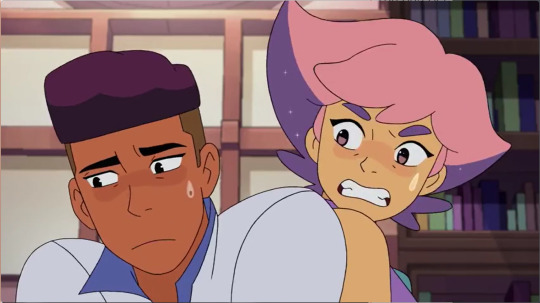
I think Bow's character takes this concept a step further and seems designed to be a foil for the story itself. Trauma slips off of this man like water off a duck's back, and his moral code is unflinching and unquestionably benevolent.
Bow exists to contrast the story's themes in a similar way to Scorpia, although I will get there in a later post. She-Ra shows all kinds of relationships going south and people making terrible decisions, and then cuts to Bow as if to say "this is how it should work."
However, Bow does engage with one theme pretty head on. The series has a recurring theme of deception that it exhibits with the First Ones and Mara, Hordak and his armour, Scorpia and her family, and Shadow Weaver's entire deal.

Bow is also caught up in a lie, that being the made-up boarding school that he told his dads he goes to. But this is also used to contrast with the rest of the cast.
In all of the examples mentioned above, when the lie is revealed, it causes some major consequences, and reshapes the worldview of those who were lied to. Bow's dads certainly have their worldview shaken up, but the consequences are skipped over, kinda.
"What's breaking our hearts is the fact that you thought you had to lie about who you are."
"You're not mad? But I'm a fighter, and you hate fighters."
"I could never hate you. Never. If you feel like you belong in the Rebellion, that's where you belong."
The series has trained the audience to associate consequences with punishment. The consequence for a failed mission is someone getting killed, the consequence for failing Hordack is the loss of breathing privileges.
The consequence for Bow's deception being revealed is an understanding being reached between him and his dads. It is a reconnection, because they value the truth, and do not hold grudges over each other. In other words, these three love each other unconditionally.
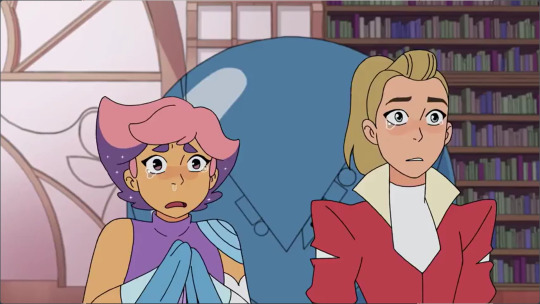
There is the key: Unconditional love. The final theme of the series that Bow has been playing entirely straight the entire time.
She-Ra as a whole has had the theme of love on the backburner. It is very clearly there, but it's never dwelled upon. Glimmer gets one over on Shadow Weaver because she cares about her friend despite anything that Shadow Weaver can say, for example. But nobody has explicitly said anything about the theme.
That is what this episode is, its telling the audience that this theme is here, and that they should start looking for it.

I do like the subversion of traditional romance in this series. The best parents in this series are Angella, George and Lance, a single mum and two gay dads. The heteronormativity of parents in literature as a whole is being messed with in this series, and I think that's great.
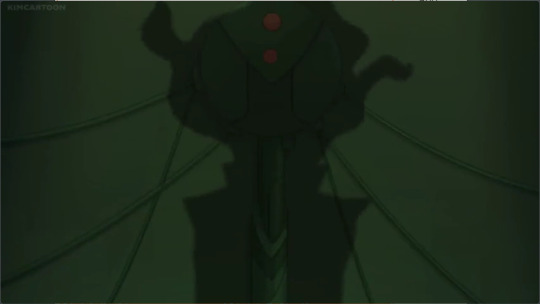
Contrast Bow's family with Catra's experience in this episode, and the key term changes from "unconditional love" to "trauma".
The scene with the shadow is a phenomenal microcosm of Catra's Post Traumatic Stress Disorder caused by Shadow Weaver. The woman isn't in this scene, but her shadow lingers, and it scares Catra out of her anger for a moment. Catra isn't scared of Shadow Weaver, she is scared of what Shadow Weaver can do. She is scared of the feeling of isolation that Shadow Weaver causes.
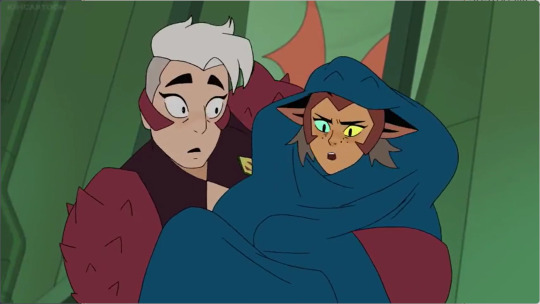
Franklin D. Roosevelt was a president of the United States of America, and is famous for saying this:
"We have nothing to fear but fear itself."
Rosevelt intended this to be a hopeful message, and I'm sure it was at the time, but it sums up Catra really well. She wants nothing more than to feel safe. That's why she loves Adora and not She-Ra, because where She-Ra can theoretically protect people from danger, Adora could protect Catra from being afraid. Catra is afraid of being afraid, and most of her actions in the series, from climbing the Horde ranks to confessing her love at the end of the series, all stem from a desire to be safe.
The series goes out of its way to show that love and safety are synonymous. Bow's dads love him unconditionally, and so he is safe to express who he really is, even if he doesn't realise it. Shadow Weaver does not love her children, and you know that because they are not safe around her.

You can see this with Adora as well in the tiny moment at the start of the episode. She sleeps with a knife, something that very few people who feel safe when they sleep do. It's a left-over behaviour from sleeping under the protection of Shadow Weaver. Adora cannot relax.
On a similar note, the Hordack thing.
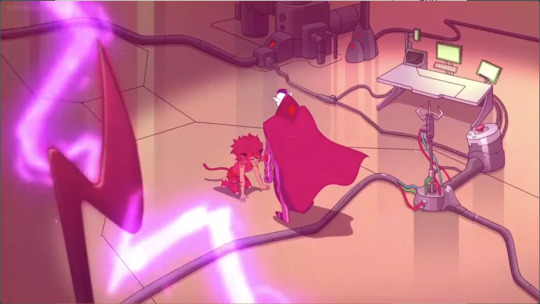
Catra is mean, that's not a criticism of the character at all, that's an observation of the person. She is the villain of the story.
But I personally don't think that it is ever acceptable to remove someone's ability to breathe, against their will, in order to make a point. I don't think that any character in a story, no matter how bad they get, should be treated like that.
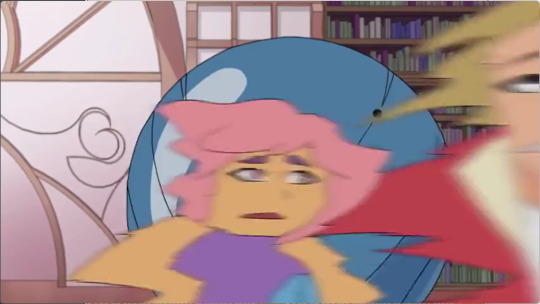
Final Thoughts
This episode is funny... mostly. There are a few jokes that don't land, and those stick out like sore thumbs, but for the most part, this episode is good.
As someone who studies history, is was genuinely funny to me to see the historians who didn't know what they were talking about. Or rather, historians that were working on theories that weren't correct. Because that's what history is. A lot of it is known, of course, but a lot isn't, and as new research is done and new evidence is uncovered, theories change.
Next week, I will be looking at The Price Of Power, so stick around if that interests you.
Previous - Next
#rants#literary analysis#literature analysis#character analysis#what's so special about...?#she ra and the princesses of power#spop bow#she ra pop#spop#she ra pop bow#she ra princess of power#she ra bow#mermista can do no wrong
13 notes
·
View notes
Note
Hello!! I briefly saw in your tags one morning about the flowers that Harry was wearing in the LNT mv. Did you ever elaborate more about the flowers? What can you tell me about them, if you don’t mind? Thanks!
Hi love!
I talked a bit about it here because it was the first thing I noticed, of course, its just a queer reading but I found it quite interesting that he was wearing the big flowers in three scenes, the observed bed/ the date/ the wedding. so it made me think of Queer Botany and The aesthetic movement in Britain and how flowers were queer coded in what comes to art either writing (oscar wilde, virginia woolf..etc) or visualized like paintings (Van Gogh's sunflowers) and decoration. And besides Lavender and violets were and still representitive for lesbians and sapphic women, the Pansy Craze well for ''pansies'' and effeminate men, green carnation is famously worn by Oscar Wilde as a symbol of homosexuality and sunflower and the lily were also one of the most recognizable floral icons of the Aesthetic Movement and their significance has a queer connotation through this movement.
and recently the V&A Museum did an exhibition called Fashioning Masculinities: The Art of Menswear with Gucci as a partnership, and on the finale of the show they had the Gucci ball gown that was worn by Harry on the cover of Vogue to talk about gender-blurring fashion X
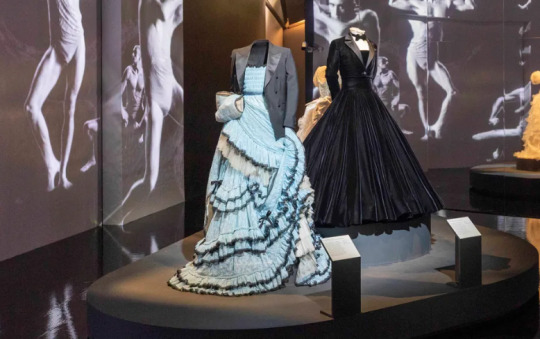
they also have Harry as the background for the exhibition announcement on the website

he is was wearing one of the now exhibited suits
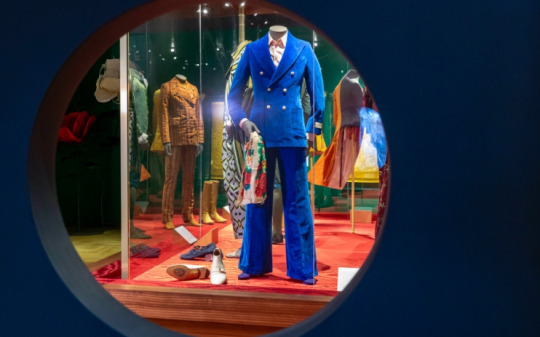
In the exhibition they also have a section called ''Queer Botany'' where they explain how flowers and botany, in general, was used to signal queer identities:

Oscar Wilde for example was famously known for wearing the green carnation during appearances ''the color green and the carnation flower were queered representations of the homosexual “underbelly” of the Aesthetic Movement'' X
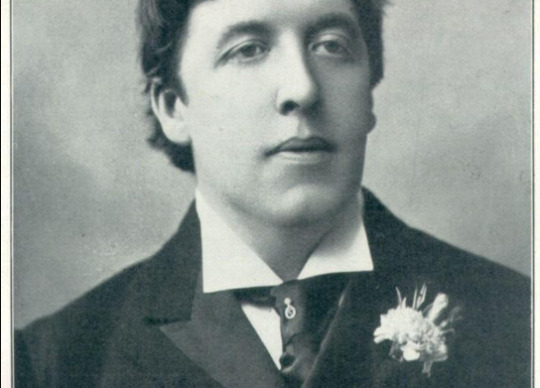
and it makes you think of the big flowers or the lilies Harry was wearing in the music video with his date and on the wedding
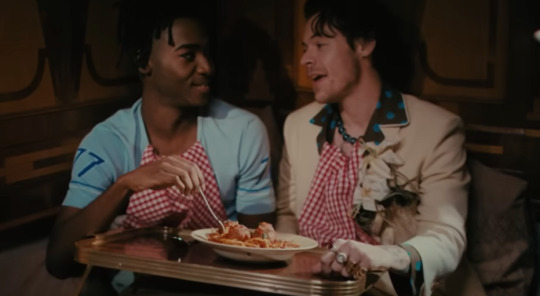
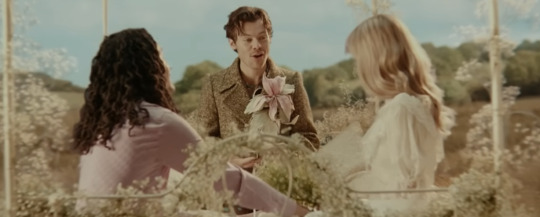
not only the Green Carnation was a representation of the queer side of the aesthetic movement but also Lilies and sunflowers.
for example, these two teapots satirise, mocking with their big flowers (lily and sunflower) tucked in their buttonhole and their limp wrists the movement, these two teapots were actually a satire with a criticism underneath it towards the way the movement was defining gender and sexuality, under the teapots is written “Fearful consequences through the laws of Natural Selection and Evolution of Living up to one’s Teapot'' portraying ''fears circulating in the 1880s about the effects that effeminacy and the blurring of gender roles might have on the future British population'' X
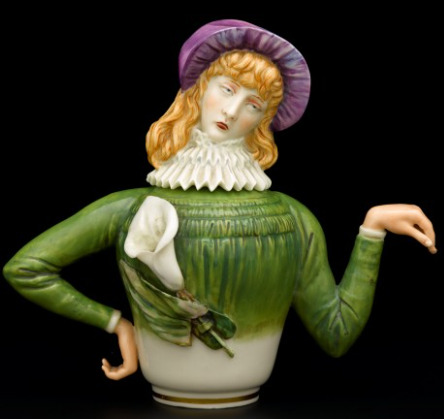

the lily and sunflowers were sort of used to symbolize how queer people used them to reverse a heteronormative meanings of the flowers, and how they were used to gender bend what feminine and masculine means:
the sunflower and lily were typically ascribed to the male and female gender, deftly queers the sunflower motif as it also existed as an “emblem of aesthetic longing” related to both unconditional, yet unrequited love [...]
the sunflower and lily are symbols of aesthetic longing and purity, respectively (..) the sunflower speaks to unrequited love that “dares not speak its name” as Wilde is often quoted, or a love that could not find valid acceptance in nineteenth-century society. X
the lilies for example, through this aesthetic movement and the queerness that defined it, these flowers were queered enough to no longer mean traditional interpretations of purity but as a way to reevaluate the definition of purity and '' arguing for a perception of queer identity that isn’t considered “dirty”'' X
like the Lily, through this movement and the queerification of botany as aesthetic, ''the actions of queer couples could be and were viewed as natural and organic within this cultural subset. Natural, beautiful, and pure, the lily could thus be invoked as the apotheosis of the Aesthetic Movement, while simultaneously being a symbol and defense of homosexuality'' X
so yeah, to just conclude, I think its really interesting that he had the flowers (that are actually from the new collection of Gucci called love Parade) with his date and while officiating that wedding :)
#sorry for the lobg post but I love talking about queerness 😭#long post#lnt#queer botany#late night talking#lnt mv
345 notes
·
View notes
Text
like, actually the most meta reason i can argue for why mike is just oblivious about his romantic feelings for will is because the general audience is oblivious too. mike and the GA are meant to realize together. because mike is the audience surrogate protagonist.
and like that's one of the reasons why people even believe in miIeven endgame, isn't it? because he's the boy protagonist and she's the girl protagonist. just heteronormativity at its finest.
#ku blarghs#strangely blogging#stranger things#mike wheeler#byler#once again. a disclaimer: it's a capital i not a lower case L for the m ship
258 notes
·
View notes
Text
Mike is straight. Byler endgame would come out of nowhere for his character.
I'm getting really frustrated with some reasons people use to rebut byler proof... The main one being this one.
I could argue extensively that Mike is queer. It is written subtextually all over the show - Mike is not like other straight characters in the show, and there are multiple parallels to queer-coded characters. If you took off your heteronormative rose-tinted glasses, you might be able to pick up on some of what the show is showing you, rather than explicitly telling you.
But even if he was explicitly shown to be straight! Why is it that in media queer characters always need to be explicitly queer from the beginning? Otherwise it's bait or fan service or bad writing? Queer people are allowed to discover themselves and figure themselves out! In fact that in and of itself is great representation! Mike's queer story would probably be really relatable to many!
PLUS! Do NOT try and tell me that Mileven were built up romantically in a natural way. First time I watched the show (January! I was very late to it ahah) Mileven actually shocked me a little - I knew they were going to date later, but it felt so random and almost a little like they didn't know what they were doing. I personally felt like they only kissed because Mike felt like that's what he was meant to do.
Lucas teasing him about only talking about El (when really Mike only talked about El as a means to get to Will, his main priority). Nancy telling Mike she thought he liked her (and Mike immediately denies it). El asking if he'll be like her brother (no. it's different... i mean, i guess its not). And then he kisses her after that?
Quite frankly, if Mike and Eleven are endgame they wrote them so weirdly. Like made some really weird writing choices (bad ones) that are too many to even get to in this post, but I am working on a really lengthy analysis on the bad writing of Mike/El (and why that's so brilliant).
AND!!!! Mike and Will are the classic example of the childhood friends to lovers trope. One common example of this trope is shown in character A being in love with character B (and has been for a while). Character B usually has another love interest, character C who is either mysterious or popular. Usually a scene where character B says "oh. A and I are just friends." while we see character A looking sad. Character B & C have some sort of relationship, but eventually it fails and in the midst of that relationship falling a part, character B realises that character A has been there all along.
Now, I personally believe Mike has feelings for Will and has had them for a while. But, even if he didn't. Don't try and tell me this wouldn't be completely fine for a straight couple. But suddenly, when they're queer, it's poor writing and fan service. Yet again, queer media is held to much higher standards that heteronormative straight media.
Anyway. In short. Byler endgame. Byler supremacy. Byler is love, Byler is life. Amen.
#byler endgame#byler#stranger things#stranger things 5#the duffers are good writers#which is why i think the bad writing of mileven is on purpose#byler peak writing frfr#mike wheeler#will byers#st s5
26 notes
·
View notes